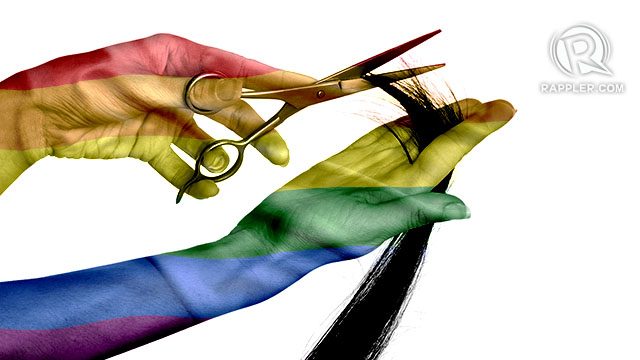SUMMARY
This is AI generated summarization, which may have errors. For context, always refer to the full article.

LOS ANGELES – Young, homeless African American Nova is sick of looking feminine and wants a part-shaved, mainly dreadlocked hairstyle that can appear a little more manly when the occasion demands.
Mainstream hairdressers are often inadequate, unable to let Nova express their complex gender identity, which falls outside of the traditional binary male-female classification.
Nova has come to Project Q, a mobile salon offering free haircuts to homeless “genderqueer” people across Los Angeles, as well as crucial support or advice on combating bullying and developing self-esteem.
“Not a lot of barbers will want to work with someone that they perceive as a woman, to cut their hair short, because they don’t know what they’re doing,” said 31-year-old Madin Lopez, Project Q’s founder.
“They try to leave it more feminine and try to make it pretty (around) the face.”
Project Q’s customers, like Lopez, mainly classify themselves as genderqueer or “non-binary” – meaning their gender identities are not exclusively masculine or feminine.
Like many in the community, they prefer people to refer to them by using gender-neutral pronouns – typically “they,” “them” and “their.”
For African American members of the LGBTQ community, finding a hairdresser who knows their hair texture and who understands what they are looking for can be a much larger challenge than for whites.
Nova, who lives in a homeless shelter, says they want to be able to feel “like a princess” on certain days but, on others, put on chest-flattening gear for a more masculine look.
In a caravan equipped with a large mirror, a swivel chair and a collection of brushes, scissors and razors, Lopez goes to work, guiding an electric razor to a background soundtrack of R&B.
‘Resistance’
A paying customer could easily be asked to shell out upwards of $700 for the complex cut Nova wants, but Lopez works free-of-charge and the equipment is covered by donations.
“I look at Nova and I see myself. I’ve been in their shoes. I’ve been someone that didnt have a place to stay,” says the softly-spoken Lopez, face broadening into a smile.
The stylist, who looks studious in circular-framed glasses, hair partly shaved, part cropped short, sees self-maintenance as a form of “resistance.”
“Preservation is key to the longevity of our cause, our activism. I use hair as a form of activism,” the crimper says.
Lopez’s goal is to be a role model for these young people, the kind of mentor figure that the hairdresser never had as a youngster.
When Lopez was 13, their parents beat them, unable to accept their child’s “queer” identity. One day, a teacher noticed Lopez had marks around their ears and the teenager was put in foster care.
“Sometimes it would take two to three weeks for me to even leave my room. And then I got my hair done, one of those times, and… something clicked. I just changed. I felt better about myself,” Lopez explains.
Before long the budding stylist was cutting schoolmates’ hair in return for bus tickets, something to eat or tampons.
High school was a breeding ground for violence, however – Lopez even recalls having friends suffer gunshot wounds – prompting them to quit classes and enrol in hairdressing school.
‘You’re going to hell’
Life remains difficult for LGBTQ youth, despite the legalization of same-sex marriage, and doubly so for those in minority racial groups.
“We’re still fighting bathroom laws,” Lopez says – a reference to the ongoing controversy in the United States over access to gender-neutral and women’s restrooms for trans people who identify as female.
Frequent headlines about black youth being killed by police and homophobic attacks such as the 2016 Pulse nightclub massacre has added to the suffocating sense of unease, they say.
“They are killing black men and they’re killing gays, and I’m black and I’m gay. So you feel like a target and it’s terrifying,” Lopez tells AFP.
Another pressure, Lopez says, is the powerful influence of Christian evangelists in African American communities, who are often intolerant of minority gender identity and sexuality.
It was a bitter lesson that Lopez learned when they decided to marry a woman.
“The night before my wedding my dad called and said, ‘You’re going to hell. I don’t want to ever see you again,'” Lopez recalls.
Many non-binary young people rejected by their families end up on the streets, a situation exacerbated by California’s chronic housing shortage.
For Nova, Lopez’s hair salon is not merely a place for haircuts, but a sanctuary from the realities of a world that can be harsh for people whose identity is not considered the norm.
“It makes my life so much easier, especially going through my transition, especially when I have questions that I don’t know how to answer myself,” Nova tells AFP.
“And having that person that you can connect with, because they understand what you’re going through, is very vital. And I feel like… they are literally saving life.” – Rappler.com
Add a comment
How does this make you feel?
There are no comments yet. Add your comment to start the conversation.